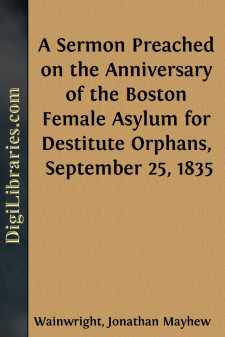Categories
- Antiques & Collectibles 13
- Architecture 36
- Art 48
- Bibles 22
- Biography & Autobiography 813
- Body, Mind & Spirit 142
- Business & Economics 28
- Children's Books 17
- Children's Fiction 14
- Computers 4
- Cooking 94
- Crafts & Hobbies 4
- Drama 346
- Education 46
- Family & Relationships 57
- Fiction 11829
- Games 19
- Gardening 17
- Health & Fitness 34
- History 1377
- House & Home 1
- Humor 147
- Juvenile Fiction 1873
- Juvenile Nonfiction 202
- Language Arts & Disciplines 88
- Law 16
- Literary Collections 686
- Literary Criticism 179
- Mathematics 13
- Medical 41
- Music 40
- Nature 179
- Non-Classifiable 1768
- Performing Arts 7
- Periodicals 1453
- Philosophy 64
- Photography 2
- Poetry 896
- Political Science 203
- Psychology 42
- Reference 154
- Religion 513
- Science 126
- Self-Help 84
- Social Science 81
- Sports & Recreation 34
- Study Aids 3
- Technology & Engineering 59
- Transportation 23
- Travel 463
- True Crime 29
A Sermon Preached on the Anniversary of the Boston Female Asylum for Destitute Orphans, September 25, 1835
Description:
Excerpt
SERMON.
PROVERBS, XXII. 9.
"He that hath a bountiful eye shall be blessed; for he giveth of his bread to the poor."
How merciful and gracious is our Heavenly Father in presenting to us his commandments, united with the promise of ample rewards to those who will obey them. As the author of our being, the creator and preserver of our means of existence, and our sources of happiness, he has an unqualified right to our constant obedience and our best services. Yet he treats us as if we were in a measure independent of him, and as if our faculties and possessions were an underived property, for he demands of us no duty or sacrifice for which he does not offer an abundant remuneration. And even to the performance of those duties which are in themselves a source of gratification to the well regulated mind, the inducements are greatly increased by appendant promises. We might not think it remarkable that labor and sacrifices, and self-denial, should be encouraged by the hope of reward; but even the delightful offices of mercy and charity will be remunerated, and heavenly blessings will hereafter be showered upon the heads of those who may now be enjoying the luxury of doing good. Surely I address myself to those who know that there is a pleasure in deeds of beneficence,—a pleasure the noblest and most delightful of which our nature is susceptible. And you my brethren, must have had experience of this sentiment, or vain will be my efforts to unfold to you the subject that is before me. I appear in behalf of the destitute orphan, and if I thought I had need to convince you that there is a sweet and abiding satisfaction in relieving those who are truly objects of charity, I should be utterly discouraged at the outset. But such is not to be my ungrateful task; for I see around me those who I doubt not have often realized the pleasures of beneficence, and have often bestowed their charities upon the simple impulse of generous feeling. I would now, however, present to you a more exalted motive to beneficence than its secret pleasures. I would show you that it is not simply a gratification you can enjoy, but a solemn duty which you must perform; and therefore that your charities are not to be governed by momentary impulses, but by settled principles, and that you are to do good not merely because you take delight in it, but that you may secure the favor of God who has commanded this service. And as I have observed that where our Heavenly Father has put forth a commandment, he has also annexed a reward to induce us to obey it, so in our text the duty of beneficence is presented in the form of a beatitude, like the introductory precepts of our blessed Lord's sermon on the mount. "He that hath a bountiful eye shall be BLESSED."
I propose, first, briefly to explain this duty, then to state its obligation, and lastly to allude to the blessing promised in connexion with it.
1. The expression of my text is peculiar. We hear in common speech of a liberal or open hand as the characteristic of a benevolent man; but the phrase, a bountiful eye, belongs alone to the sacred scriptures....


